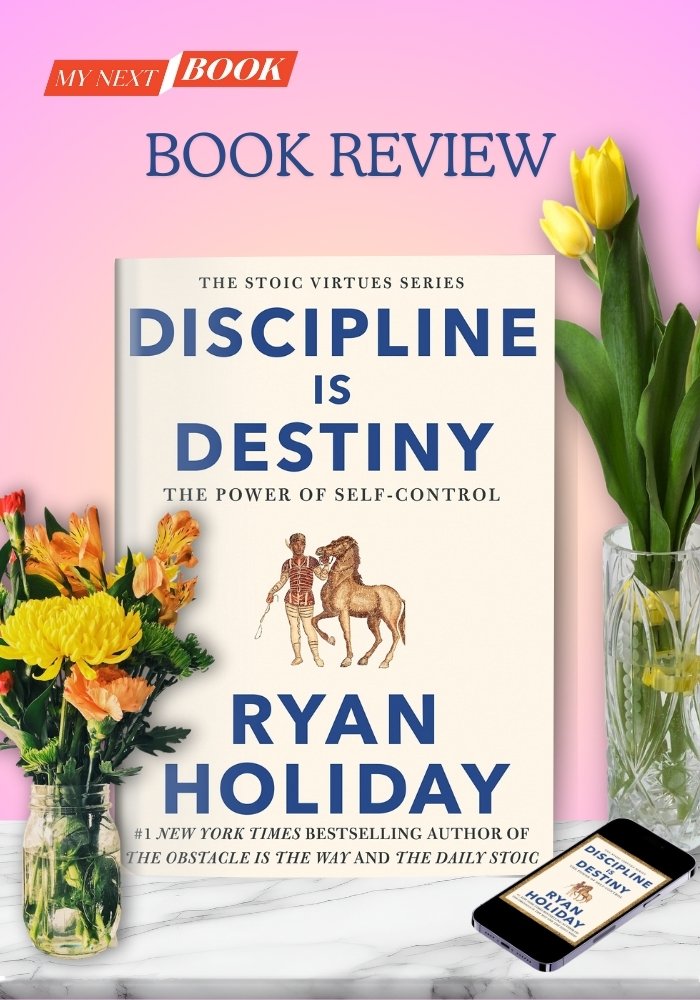Introduction:
In today’s world, filled with constant distractions and the allure of quick satisfaction, the concept of discipline is often overlooked. Ryan Holiday’s “Discipline Is Destiny: The Power of Self-Control” brings this crucial virtue back to the forefront, illustrating its essential role in shaping a meaningful life. This review will delve into Holiday’s book, highlighting specific examples and arguments he uses to demonstrate how disciplined choices can fundamentally alter our paths. By showcasing how discipline molds our decisions and ultimately our futures, Holiday provides a compelling case for its necessity in our daily lives.
Overview of “Discipline Is Destiny”
Ryan Holiday’s “Discipline Is Destiny” explores the transformative power of self-control, bridging the gap between ancient wisdom and contemporary challenges. Holiday employs a compelling mix of historical examples and philosophical reasoning to demonstrate that discipline is essential for personal and professional success. For instance, he delves into the disciplined approaches of figures like Marcus Aurelius and contemporary leaders, showing how their habits contribute to their achievements and character.
The book is thoughtfully organized into chapters that each focus on a different aspect of discipline consider the concept of ‘self-control as freedom’. Here, Holiday suggests that true freedom comes from within, arguing that self-imposed discipline frees us from external pressures and fleeting desires. Another intriguing section discusses the ‘ethical dimension of discipline’, where he examines how our personal standards shape our interactions and the integrity of our communities.
Holiday’s narrative also makes stoicism practical for today’s readers, offering exercises and daily practices that help embed these philosophical teachings into everyday life. By translating stoic principles into actionable steps, he makes the philosophy both accessible and useful, providing readers with tools to harness their own discipline to improve their lives. This approach not only makes ancient wisdom relevant but also actionable, offering a clear pathway to personal greatness.
Key Themes and Principles
Ryan Holiday’s “Discipline Is Destiny” presents a provocative notion that true freedom is achieved through disciplined self-control. He challenges conventional views by illustrating how self-discipline liberates us from the fleeting desires that distract from our long-term aspirations. This perspective is particularly relevant today, as we navigate a world brimming with distractions that can derail our focus from what truly matters.
Holiday emphasizes the transformative power of routines and habits, exploring how both mental and physical disciplines like meditation or a consistent work ethic forge a path to our most accomplished selves. He details specific habits that anyone can adopt to cultivate discipline daily, making the concept of self-improvement tangible and achievable.
On resilience, Holiday contends that self-discipline is our armor against the inevitable adversities of life. He connects this idea to common struggles, such as professional setbacks or personal loss, suggesting that a disciplined mind can maintain stability and clarity through turbulent times.
Furthermore, Holiday explores the ethical dimension of discipline, arguing that disciplined individuals inherently contribute more to societal well-being. He supports this claim with examples of how disciplined behaviors promote integrity and altruism within communities, emphasizing that personal discipline extends its benefits far beyond the individual.
By delving deeper into these themes, this overview not only clarifies Holiday’s arguments but also underscores their relevance, inviting readers to reflect on how discipline shapes not just personal success but also collective progress.
Strengths and Weaknesses
Ryan Holiday’s “Discipline Is Destiny” excels in its storytelling, transforming abstract concepts into relatable lessons through engaging narratives. For example, Holiday vividly recounts how Marcus Aurelius applied daily stoic principles to govern effectively, providing a tangible model for readers. This technique effectively bridges historical wisdom with modern-day applications, showcasing discipline’s timeless value.
However, the book’s reliance on historical examples sometimes overshadows the need for contemporary relevance. While the lessons of the past are invaluable, today’s readers face unique challenges, particularly in the digital realm. The book could benefit from incorporating modern psychological studies or insights from current thought leaders in technology and wellness. These additions would not only enhance the narrative but also offer practical strategies for applying discipline in the context of constant digital distractions.
Moreover, given the pervasive influence of social media and online environments on our daily lives, a deeper exploration of how to maintain discipline amidst digital overload would be particularly beneficial. Strategies for managing digital consumption or examples of individuals successfully navigating this landscape would make Holiday’s arguments more applicable to the current era.
By sharpening the critique of the book’s gaps, especially its applicational relevance to contemporary issues, this review aims to provide a balanced perspective that acknowledges the book’s strengths while also highlighting areas for enhancement. This approach not only makes the review more trustworthy but also guides potential readers in setting the right expectations.
Personal Reflections
Reading “Discipline Is Destiny” was a profound experience that acted as a reflective surface for my own practices. It compelled me to scrutinize my daily routines and their alignment with my aspirations. One habit I questioned was my evening routine, which often involved aimless internet browsing. Recognizing this as a distraction from my goal of writing a book, I reshaped my nights to include dedicated writing time, reinforcing Holiday’s insight: “We don’t rise to the level of our expectations, we fall to the level of our training.”
This quote was a pivotal moment for me, underscoring the significance of incremental, consistent efforts over occasional bursts of energy. In response, I began a daily regimen of writing 500 words, a modest but steady step towards my larger objective. This change was not just about adding a task, it was about forming a discipline that incrementally builds towards my vision, echoing Holiday’s theme that small disciplines can lead to substantial achievements.
I encourage readers to reflect on this concept and consider their own daily practices. What small discipline could you introduce today that might pivot you closer to your long-term goals? Whether it’s waking up 30 minutes earlier to meditate or setting aside time each evening to plan the next day, the key lies in consistent application. Through my own adjustments, inspired by Holiday’s teachings, I’ve realized how structured habits pave the way to achieving one’s highest potential, making the lessons of “Discipline Is Destiny” not just theoretical but immediately actionable.
Applying the Concepts in Real Life
The book’s principles are surprisingly practical. For instance, adopting a simple morning routine can be a step toward greater self-discipline. Whether it’s waking up at a consistent time, exercising, or meditating, these acts of self-control set a tone of purpose for the day. Moreover, Holiday’s emphasis on resilience through discipline offers a fresh lens to view setbacks not as failures, but as opportunities to fortify our character.
Balanced Critique
While “Discipline Is Destiny” offers invaluable insights, it’s essential to consider the potential pitfalls of overemphasizing discipline. Excessive discipline can morph into a rigid routine that stifles creativity and spontaneity, possibly leading to burnout. For example, Holiday’s praise of unwavering daily routines, while beneficial, might not emphasize enough the importance of adaptability and the occasional need for breaks to maintain long-term productivity and well-being.
In discussing the balance between discipline and flexibility, Holiday champions using discipline as a tool to live by our values. Yet, the book could further explore how to integrate grace into this framework. Practical strategies might include scheduling regular ‘free days’ for spontaneous activities or setting clear boundaries to prevent discipline from becoming suffocating. This approach would allow individuals to maintain their drive without losing the joy and unpredictability that enrich life.
Moreover, integrating cultural and personal differences into our understanding of discipline could enhance this balance. Not everyone benefits from the same level of structured discipline, what works for one might be overwhelming for another. Acknowledging these variances can help tailor a discipline strategy that respects individual needs and lifestyles.
By delving deeper into these aspects, the critique not only highlights potential limitations in Holiday’s arguments but also provides readers with a framework for applying discipline in a healthy, balanced manner. This enriched perspective encourages a more personalized and thoughtful application of the principles outlined in “Discipline Is Destiny.”
Engaging with the Reader
For those uncertain about diving into Ryan Holiday’s exploration of discipline, consider this compelling proposition: in a culture that often prioritizes immediate gratification over long-term achievement, embracing discipline represents a radical act of self-assertion. It is a deliberate choice to swim against the current of quick fixes and instant results, establishing a foundation for deeper satisfaction and success.
“Discipline Is Destiny” is more than just a book, it’s a call to embark on the most enlightening journey there is the journey within. Engaging with Holiday’s work offers a chance to transform not just your daily routines but also your inner landscape. Imagine gaining the clarity and confidence that comes from aligning your actions with your deepest values. This isn’t just about external achievements but about fostering inner growth and resilience.
If you’re hesitating, you might wonder if the insights will be relevant to your specific circumstances or if the commitment might be too demanding. It’s natural to question whether the effort will truly pay off. However, Holiday’s approach is not about imposing strict rules but about finding and refining your own sense of discipline tailored to your life and your goals.
I invite you not just to read but to engage with these ideas. Reflect on what discipline means for you. Discuss it with friends or in online forums. Share your reflections and challenges. This book is your starting point for a conversation about how structured self-control can unlock your potential and enrich your life.
By enhancing your connection with these concepts, you transform reading into an active, ongoing exploration. “Discipline Is Destiny” isn’t merely a book to be read it’s an experience to be lived and shared.
Conclusion:
“Discipline Is Destiny: The Power of Self-Control” stands out in the crowded field of self-improvement by merging profound historical wisdom with actionable strategies. Ryan Holiday doesn’t just preach the virtues of discipline, he connects the dots between ancient practices and modern challenges, making his approach both unique and immensely practical. This book isn’t merely a collection of ideas but a catalyst for profound personal transformation a tool that challenges you to match the rigor of historical figures with the complexities of your contemporary life.
Mastering oneself is perhaps the most daunting yet transformative journey one can undertake. It’s about more than just self-control, it’s about reshaping your life in the crucible of daily decisions. As we conclude this review, I challenge you not just to be inspired by the concept of discipline but to actively incorporate it into your daily life. Reflect on this: What disciplined decision can you make today that will steer you toward the life you truly desire?
To all the seekers of growth, “Discipline Is Destiny” is not just a clarion call it’s a summons to action. Are you ready to respond? Turn the first page, make that first deliberate choice, and begin the journey that will redefine your destiny.
By enhancing the specificity and emotional appeal of your call to action, this conclusion not only underscores the unique aspects of Holiday’s approach but also inspires readers to immediately engage with the transformative power of discipline.






